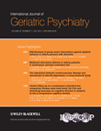Anosognosia for memory deficit in amnestic mild cognitive impairment and Alzheimer's disease
Abstract
Objective
to investigate patterns of anosognosia for memory deficit in subjects with amnestic mild cognitive impairment (MCI) and Alzheimer's disease (AD).
Methods
the study involved twenty-five subjects with MCI, 15 with mild AD and 21 normal controls (NC). Subjective rating of memory functioning was assessed with a six-items questionnaire that was administered before and after memory testing; an informant version from caregivers gave a discrepancy score (SRD). In the Objective Judgement (OJ) task, aiming to evaluate memory-monitoring abilities, subjects were requested three times to predict their memory performance in recalling words from a list of ten. Then they had to recall the words. Prediction accuracy was computed by subtracting the predicted performance from the actual performance.
Results
MCI and AD showed reduced awareness of memory difficulties at the SRD and did not change their rating of these difficulties after memory testing. At the OJ task, MCI and AD consistently overestimated their memory performances as compared with NC. The SRD and OJ measures were not correlated with some patients being impaired on only one measure. Only the OJ measure was significantly related to executive functioning.
Conclusions
AD and MCI subjects show unawareness for memory deficit and significant memory-monitoring disorder. This confirms that anosognosia is an important symptom of MCI. Similarities of patterns of impaired awareness between AD and MCI supports the view of a continuum of the anosognosia phenomenon in MCI and AD. Copyright © 2010 John Wiley & Sons, Ltd.




